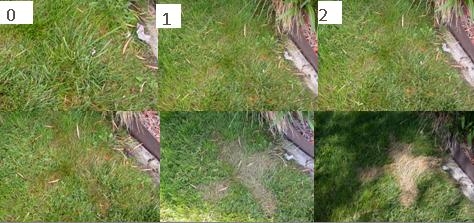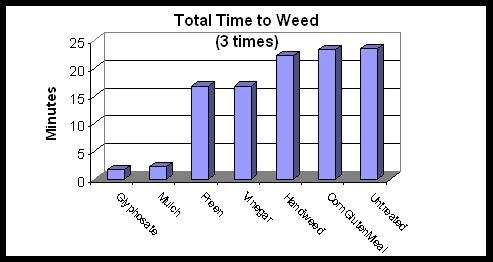- Author: Cheryl Wilen, UC IPM South Coast Area Advisor, cawilen@ucdavis.edu
- Posted By: Gale Perez
The public's increasing demand for safe “green” products has resulted in many new environmentally-friendly products becoming available for controlling weeds in the garden and landscape. Even though information for home gardeners on the efficacy of these new products is limited, their use is still heavily promoted by environmental awareness groups and public agencies in an effort to reduce the use of other herbicides that have a greater potential to contaminate surface waters. Retailers are beginning to dedicate shelf space to pesticides that are considered least-toxic alternatives; most of them containing essential oils or other natural plant extracts targeting weeds.
The majority of these “green” weed-control products are botanically based oils (e.g., clove oil, eugenol, and d-limonene), soaps (e.g., pelargonic acid), or acetic acid that control weeds by destroying the leaf cuticle or causing cell leakage that rapidly leads to death. Unfortunately, because these herbicides kill only green parts of the plant they contact, they don't provide long-term control of weeds with extensive root systems or underground storage structures such as rhizomes, tubers, or bulbs. Thus many treated plants are able to recover. In contrast, some conventional herbicides such as glyphosate or 2,4-D are translocated to roots or underground storage structures to kill larger plants and perennial weeds.
These types of herbicides are applied after the weeds have emerged (postemergent) and have little or no soil residual activity. They don't control weed seedlings that germinate after application. They kill the plants by breaking down plant membranes and are considered contact or burndown herbicides. These herbicides are very fast acting (Figure 1), but to be most effective they must contact all or most of the aboveground plant tissue. It is especially important to spray the growing points, or else the plant will regrow. Grasses and perennial weeds are difficult to control for an extended period of time, because they have some or all of their growing points below ground.

However, in some cases, especially where annual weeds are small, these products may be appropriate. These herbicides are best used on small weeds and annual weeds or for controlling weeds in cracks and, in some cases, edging. They can be used for spot spraying, but care must be taken that the spray or drift doesn't contact desirable plants or else leaf spotting or death will occur.
Increasing the Odds
Ways to improve efficacy when using these types of herbicides include:
- Good spray coverage;
- Application in warm weather (75° to 80°F);
- If using concentrates, addition of surfactants that improve weed control;
- Treatment when weeds are small; and
- Repeat applications for larger weeds, in most instances.
Corn Gluten Meal
Another common natural herbicide is corn gluten meal (CGM). While the previously listed herbicides are postemergent types, CGM is sold as preemergent herbicide. Although being widely touted as an effective herbicide that will control seedlings as they geminate, we have conducted numerous tests with this product and haven't been able to get results that justify its use as an effective preemergent herbicide. For example, there were no differences in the time needed to remove weeds from plots treated with CGM than from plants that were handweeded or from plots that were not subjected to any other treatment (Figure 2).

So the question is: Are natural herbicides safe and effective? If used as part of an integrated pest management program, the contact herbicides fit very well. Users should know that they won't get the same kind of long-term weed control as products containing glyphosate (e.g., Roundup). The user should also be aware that many of the plant based or “natural” products can cause skin irritation or eye or lung problems. Eye protection and gloves as well as any other label requirements should be worn when using these natural herbicides, even if they are listed as exempt products. Note that some of the acetic acid products can be quite hazardous to handle.
Trade Names
Examples of plant essential oil-based herbicides include WeedZap, Bioganic Broadleaf Killer, and EcoSmart Weed and Grass Killer.
Examples of orange oil (d-limonene) based herbicides include Avenger and Worry Free Weed and Grass Killer.
Examples of acetic acid-based herbicides include WeedPharm (Signal word: Danger), AllDown, and Grotek Elimaweed Weed and Grass Killer. Note: The acetic acid concentration for herbicidal use should be about 10 to 20%. Household (food-use) vinegar is about 5% acetic acid and isn't effective for controlling most weeds.
Examples of fatty acid-based herbicides include Scythe, Safer Moss and Algae Killer, Safer Fast Acting Weed and Grass Killer, Monterey Herbicidal Soap, and Natria Weed and Grass Killer.
Combination products include Burn-out II (clove oil plus citric acid) and Earthtone 4n1 Weed Control RTU (soap of fatty acids plus maleic hydrazide, a growth regulator).
To view the actual article, visit
- Retail Nursery and Garden Center IPM News (http://www.ipm.ucdavis.edu/RETAIL/retail-newsletter.html)
- Green Bulletin (http://www.ipm.ucdavis.edu/greenbulletin/index.html)



Thanks, J
I appreciate your comments but I think you may have misunderstood this post as there was no reference to glyphosate having residual activity in the soil although it did make a comparison to that herbicide compared to some "natural" products. Regarding the issues you raise about residual activity, micronutrient chelation, and bacteria on the rise, I have seen very little compelling scientific evidence to support those claims. What I have seen is generally not backed by peer-reviewed science, has not been reliably repeatable in subsequent research, or occurs in such specific conditions as to be an anomaly rather than representative of the whole.
Given that, it shouldn't be used where it might get onto the edible portion of a food plant.
-edited to remove hyperlink
-Editors note: Dr. Seneff's training includes a BS in Biophysics, an MS and EE in Electrical Engineering, and a PhD in Electrical Engineering and Computer Science. In recent years, she has coauthored a number of papers exploring links between glyphosate and human health problems.
I believe those data are "amount of time it takes for three handweeding operations (minutes per plot)". So, untreated plots with no weed suppression would be the weediest and would take the longest to go through and remove all the weeds by hand.
Looks like mulch was similarly suppressive compared to the glyphosate treatment (~2 minutes hand weeding per plot) while the others were poor (15-20 minutes hand weeding per plot).
Hope that helps.
Brad
--Berkeley sewer replacement
I subscribed to your blog and shared this on my Twitter. Thanks again for a great post!
Jane
But what about science? I still have an unopened jug of the stuff, which I have declined to use the last couple years, feeling increasingly queasy but still withholding judgment, until someone less overwrought than my organic grocery girl could tell my why I should take it to hazardous waste disposal. I always used as directed in a small area and infrequently. Should I not resume this practice? Should I put it in my massive safe deposit box until after the climate apocalypse? In the meantime, I hear I can just use boiling water and salt on the invasive grasses. Broadleaf too?
Thats my mother, the environmental toxicologist, groaning in the background, like these were stupid questions. Not a lot of sympathy in that one. Its too soon to "check the literature" and I still need to know. Any advice for going forward?
IN PULVERIZE , they also claim that it is very effective and takes care of the weed at their roots level without having adverse effect on the grass.
Please give youe experiences and thoughts about it.
Thanks